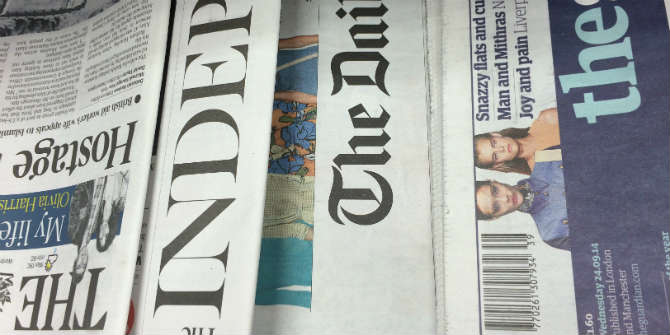Was the Daily Mail editorial of 16th November a bolt from the blue, or is it part of a longer term newspaper campaign to undermine the Leveson Inquiry?
The Media Policy Project monitored editorials about Leveson from its start in September 2011 until July 2012 when hearings concluded. What the analysis shows is that there has always been a willingness to ‘editorialise’ about Leveson, but that – at least until very recently – newspapers were keeping their powder dry, and maintaining a neutral stance. The first few months are of particular interest because this is when Leveson and his assessors were appointed and the terms of reference were established and put into action[1].
At this time the papers not only refrained from criticizing the choices made, but newspaper editorials in fact featured a degree of optimism and self-reflection towards the hearings. Recognising gross misconduct by sections of the industry, both The Times and The Guardian defended the Inquiry—which was branded a futile exercise by some media circles–as a chance to scrutinise and curb the sector’s excesses. The former, in a lengthy lead article entitled, “The Future of the Press,” saw Leveson as a potentially positive development that could result in a ‘freer British press that treats people better.’
These sentiments, however, weren’t entirely shared by the Independent, which twice lamented that the Inquiry was not a fair reflection of the newspaper industry: It called on Lord Leveson to distinguish between good press—the one that informs the public and holds power to account—and bad press, or the side engaging in bribery and inexcusable behaviour.
Indeed, the merits of an autonomous press—and papers’ ability to keep not only politicians but each other in check, as exemplified by The Guardian’s exposé on News of the World phone hacking–was much discussed by editorials in this period, both by way of highlighting the role of journalism as upholder of free speech in society and, more overtly, in justifying rejection of statutory regulation. It is in the latter that The Guardian emerged as a lone voice in advocating for supporting legislation—albeit one that is tempered and acceptable to the press–if only to compel newspapers to join the new self-regulatory body. It likewise stood apart in singling out lax media ownership laws as a cause for newspapers’ ethical violations –a deficit that it expected Leveson to address in his output.
Yet even papers averse to any sort of legal controls were constructive in issuing precaution. Underpinning a common call for a move from self- to independent regulation were ideas on how to give the post-PCC body the teeth that it needs. The Guardian, conceiving of it as a one-stop-shop for quick dispute resolution, also suggested that it must require newspapers to have their own readers’ editor to promptly correct editorial mistakes, while The Times, which agreed that the new body have investigative and punitive powers, stressed best practices, among them the initiative to notify the subject of a report prior to its publication. The newspapers’ early suggestions seem to have been heard at least by Press Complaints Commission chairman Lord Hunt, whose own proposals express unwavering confidence in the industry’s capacity to police itself.
Newspapers’ attitudes towards the Inquiry have see-sawed since. The LSE Media Policy Project has found that editorial opinion became more critical after the last hacking victim left the courtroom and politicians and industry executives took their place on the witness stand early this year. By June, The Times, in particular, had expressed exhaustion with the hearings’ inordinate length and wide remit. Nevertheless as the graph below shows, the overwhelming majority of editorials maintained a neutral attitude towards the Inquiry itself[2].

All this makes the timing of the Daily Mail attack all the more interesting: all the facts about Leveson were known before November, but arguably more now is known about what he is likely to recommend, and the Daily Mail, for one, is almost certain to have received a letter under Section 14 of the Inquiries Act, which details the criticism that Leveson will level at them. We will continue to monitor editorialising about Leveson, as well as news coverage about the report, as part of a broader attempt to scrutinise the exercise of press power at this crucial time.
[1] The sample consisted of 20 editorials from The Guardian, The Times, the Independent, Daily Mirror and Financial Times, which were published from September 2011 to January 2012. Alexandra Kulikova, Helene de Chalembert and Paula Brito contributed to this report.
[2] The sample for this analysis consisted of 153 staff-written editorials from The Guardian, The Times, the Independent, The Telegraph, Daily Mirror, The Sun Daily Mail, and the Financial Times, which were published from September 2011 to July 2012. Each opinion piece was coded as having taken either a neutral, positive or a negative view of the Leveson Inquiry.



